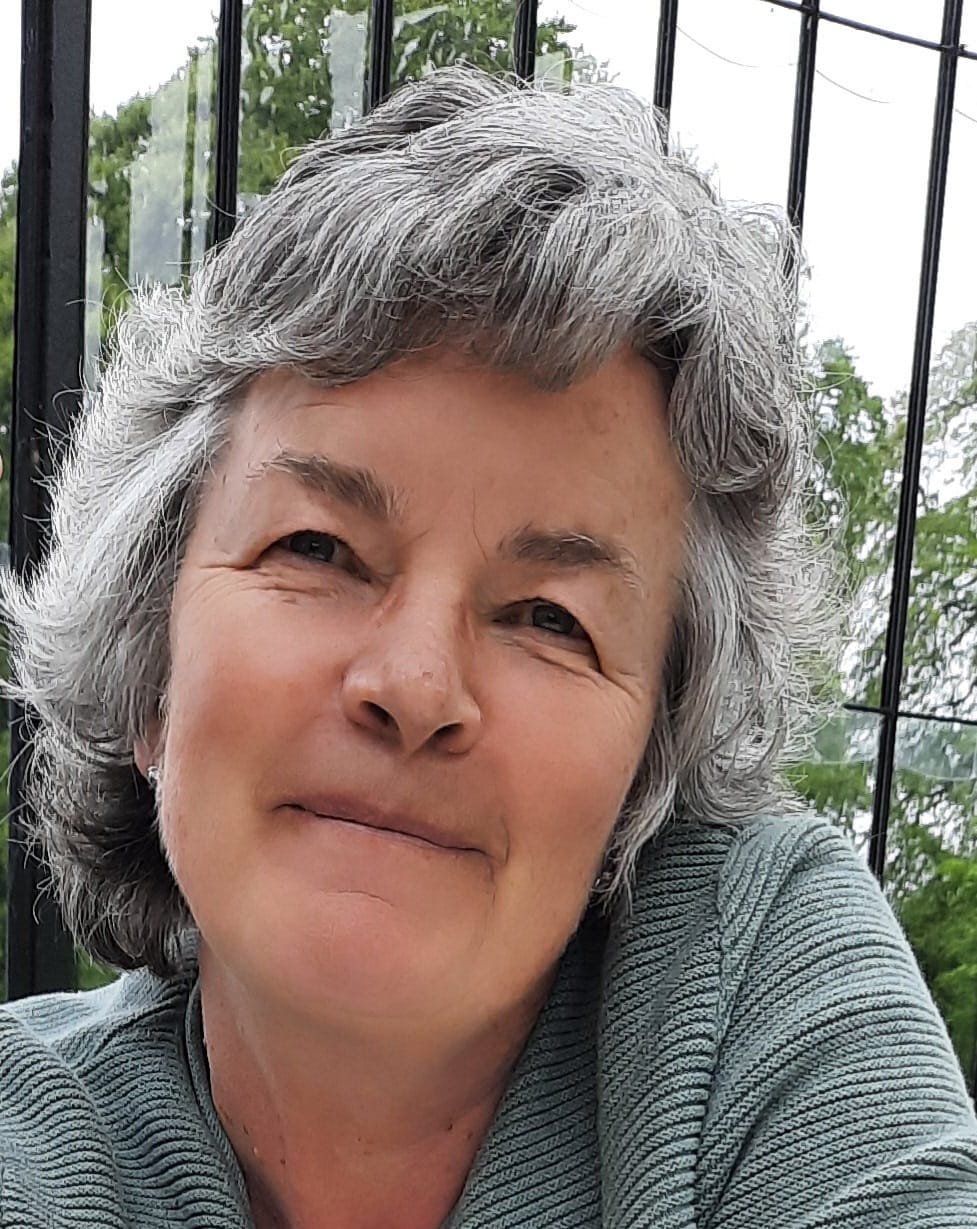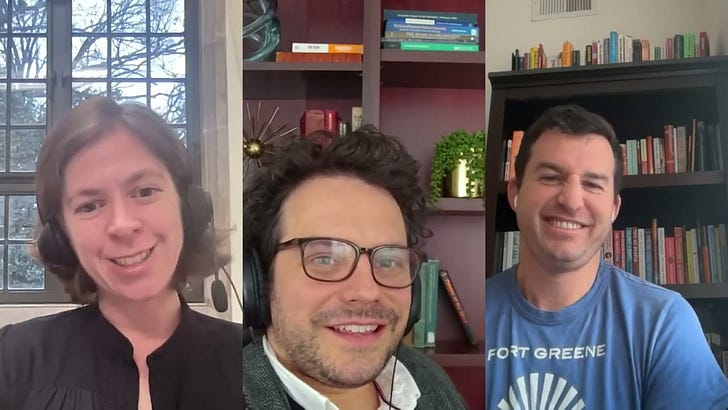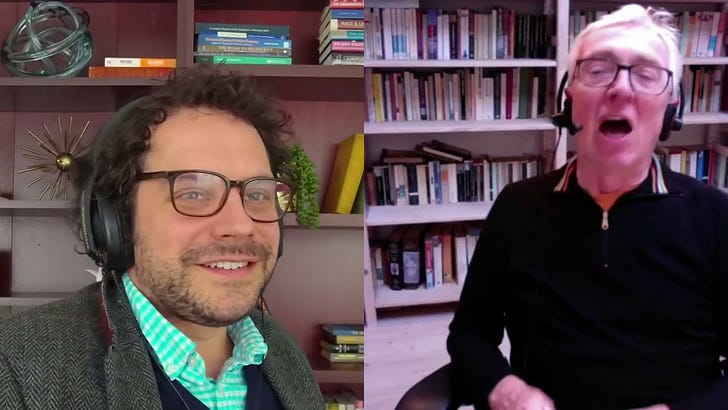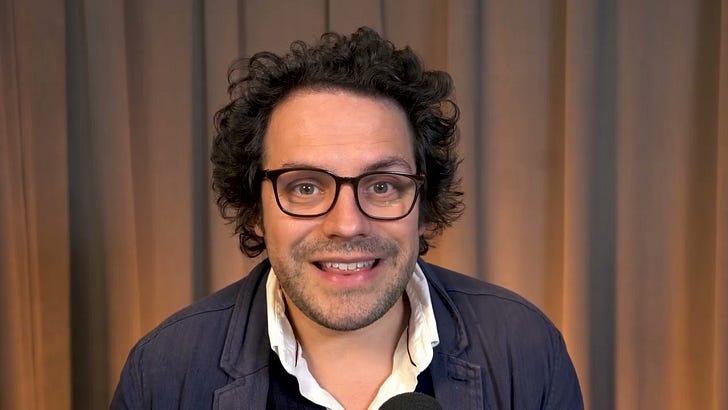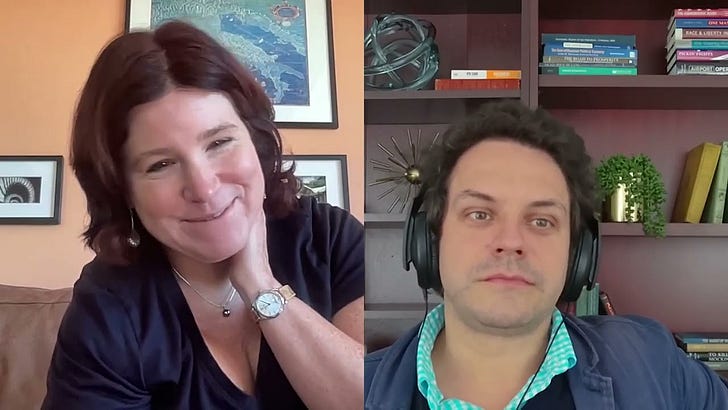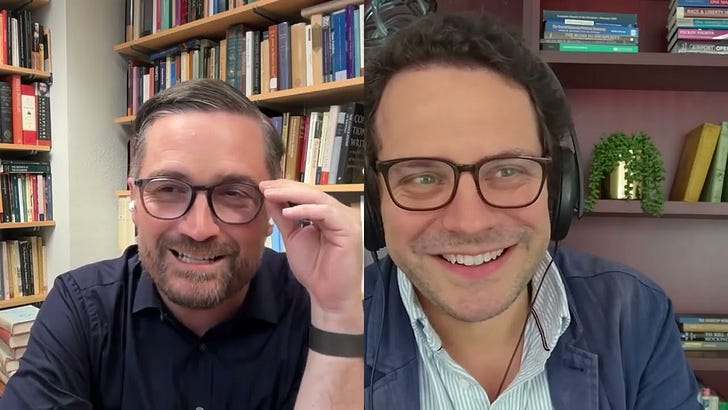It was such a pleasure to talk to Sarah Harkness. Sarah is a former partner at Arthur Andersen who had a career in corporate finance and then as a non-executive director. She is now a literary late bloomer. She has self-published a book about the Victorian artist Nelly Erichsen. She has an MA in Biography from the University of Buckingham, where she studied with with Jane Ridley. She won the Tony Lothian Prize, 2022. And she is now writing a biography of the Victorian publisher Alexander Macmillan and his brother which will be published next year. We talked about Sarah’s career, her long-held ambitions, what she learned from corporate finance, her views on talent spotting, Alexander Macmillan, how Sarah would try to discover other late bloomers lurking in the wrong jobs, and why a business career helps you to understand Victorian literature.
Being a Late Bloomer and Alexander MacMillan
Henry: Are you a late bloomer?
Sarah: My husband says I should be very annoyed at that question because he says I've been marvellous all along. I think I'm a late bloomer if in the blooming bit, which is that I'm now doing something that makes me really unconditionally happy, whereas before I did a lot of stuff that was sometimes important and sometimes well paid, but I never enjoyed it half as much as what I'm doing now.
Henry: So, let's start with just briefly, what are you doing that makes you really happy now?
Sarah: I have a contract to write a book that a proper-publishing house says they're going to publish. So I'm writing a biography, a double biography called The Brothers of Daniel and Alexander Macmillan, who founded MacMillan publishing 180 years ago. And it's taken me a while, but I've got an agent and I've got a publishing contract, and I need to submit a manuscript in the next eight months, and it will come out in 2024 all being well. And that's making me very happy.
Henry: Good, and that's the grandfather or great-grandfather of the prime minister?
Sarah: Daniel is the grandfather of the prime minister, and Alexander, who's the one who really built the business after Daniel died, is his great uncle.
Henry: So an interesting family for more than just their business interests.
Sarah: Yeah. And I mean, fantastic achievers themselves because Daniel and Alexander were born into absolute poverty on the West Coast of Scotland. Their father was a carter, who died when they were young boys. Daniel left school at 10, Alexander when he was 15. And by the mid-1860s, Alexander is one of the literary hosts of London, and within two generations, they have an offspring who will be prime minister and married into the Duke of Devonshire’s family, it's quite a climb.
Henry: So, what we're talking about, this is really the Victorian self-made man?
Sarah: Absolutely. Samuel Smiles and all his glory, absolutely.
Henry: Yeah, yeah, we love Samuel Smiles.
Sarah: Yeah, same.
Henry: So, where does your interest in that type of subject or person come from?
Sarah: Well, there's a basic love of all my period, of all the periods of history and all the periods of literature, Victorian times would be absolutely bang on is what I know most about. I'm very comfortable working in that time, and I love the books and the poetry from that time. The way I found it was very serendipitous, which was that my husband collects art and had found a lot of art by a big, very unknown Victorian woman painter. And I researched her life, and the more I researched it, the more I thought I need to write this down, and it turned into a book that no one would publish, but people said to me, "Write about someone we've heard of and come back to us," and that's a really hard question because almost everyone you've heard of has got a book.
That's why you've heard of them, but I had a stroke of luck, which was literally in the research on the book about... The artist is called Nelly Erichsen, and in my research on her, she was a neighbour of the MacMillan family in South London in the 1870s, and related by marriage, sort of in a hop and a skip to the MacMillan family, so she knew the MacMillans, she stayed with the MacMillans. And I did research the MacMillan family to write about Nelly, and there wasn't a book, there haven't been a book since the 19... Since 1940. So there was an opening to do a book because most people have heard of MacMillan Publishing, most people would think it was interesting to understand how that had been started and no one has written about it for 80 years. So that was the stroke of luck, I think.
Henry: So it comes from a kind of a long-term immersion in the period and a very indirect discovery of the subject matter?
Sarah: It does, it does. I mean, I have been talking about Nelly Erichsen and her bit of Tooting where she lived and the people that she knew for, gosh, nearly 20 years now, so I mean it is a long immersion, but it took me a very long time to have confidence to show anyone what I was writing about it.
Early interest in Victorians
Henry: Yeah. And that if we go back 20 years, is that where you start sort of reading and working on this?
Sarah: Yes.
Henry: Or had you been reading about the Victorians from earlier?
Sarah: I think that... I mean, I did PPE at Oxford, but my favourite paper and finals was Victorian social political history, so the 1860s is bang on the period. I think all the time I was working and having a career, I was reading my way through Trollope and Dickens and George Eliot, so... And Tennyson. So that in that way, and it's the sort of art I like, so it is definitely my spot, but I had never thought about researching online, finding out about anyone and writing it down until, yeah, 15 years ago when I started doing that.
Henry: But when you started doing that, you'd actually had years of reading the novels, being immersed in the period, it goes back, you were ready, you weren't just coming to this out of nowhere?
Sarah: Yes, I wasn't, I wasn't. And it does remind me that about... Well, it was at the time when my children were babies, I wanted to give up work and study Victorian literature. I mean, I felt then that it was something I wanted to do, and I had an idea of writing... The book that inspired me was some Anthony Trollope’s The Way We Live Now.
Henry: Fantastic book.
Sarah: And I was fascinated, yeah, fascinated by the Melmotte character and I wanted to do an MA or something that would allow me to write, to use the knowledge I had at the city today against what was Trollope writing about, I thought that would be interesting. So I have thought about it 25 years ago, and that had to absolutely no encouragement from anyone to do anything about it. So I didn't, I kept working, but it's funny that that's almost where I've ended back up, which is looking at Victorian literature.
Henry: Yeah, it's like a... It's a deep vein that runs through your life and now it's come to the surface.
Sarah: It is, it is, absolutely.
Sarah in the City: business expertise as a literary advantage
Henry: So, you've hinted it that you did PPE, you were in the city, tell us, because you were already blooming before, you are not a late bloomer, you're a repeat bloomer, tell us what was happening when you weren't being a Victorian writer.
Sarah: So, I went from Oxford into the city into a corporate finance house that was part of NatWest Bank, so we call that NatWest markets, and I did corporate finance, so flotations, mergers, takeovers, raising money from 1983 right the way through to 1990s. In the 1990s, I left London and moved up to Yorkshire, but I kept working. And at that point, I had small children, so I was working three or four days a week, working in Leeds doing corporate finance. And then there was a big excitement in 1998 because I left NatWest and took my team into Arthur Andersen, which at the time caused a bit of a fuss and a bit of a stir. And I had three or four... Four years at Arthur Andersen. And then Arthur Andersen went into liquidation. And at that point, I'd been doing corporate finance for nearly 20 years and I'd had enough of it, and there were a lot of young and unpleasant young men coming up who didn't think that women in their 40s with children should be stopping them doing what they wanted to do. So I did head-hunting for a little while, and then I started becoming a non-executive director, so I became plural. And I'm still plural, I still do trustee jobs, and audit jobs, non-executive director jobs.
Henry: So you, in three different ways, at Arthur Andersen, and then as a head-hunter, and then as a non-exec, you've actually been a senior person. You've been running an area of a business, you've had that kind of oversight?
Sarah: Yeah.
Henry: Does this help you... You've got the background reading Trollope and understanding the character of Melmotte, but you've also got the background as actually a business person. So when you look at someone like MacMillan, if you hadn't done that career, you would have had less insight. Do you sort of...
Sarah: I think that's right, I think that's right. I've spent some time in the archives just the other week looking at the partnership deeds from when he set the business up. I've looked at... There had to be a court case in Chancery when Daniel's widow died because she died in testate and there was a risk that the partnership would have to be dissolved and split around his children. So to me, that makes sense. The big risks that he takes, like moving from Cambridge to London, and then at the moment, I'm really interested in him opening an office in New York, which he did in 1869. I mean to me, that is about a business risk. And then, this little small bit. So at the time when I was running an office in Leeds, I was very conscious of how vulnerable you feel when you are not in the head-office, when you are running a satellite. And I've been reading this week, the letters coming back from New York to London, from the poor chap that Alexander sent out to New York. And I can... I mean, I could have written those letters, you know, "Just tell me what's going on?" "What are your plans?" "What do you mean your son's coming to work here?" "Is that alright? Is that a good sign?" And so that to me is business as well, so I do recognise a lot of it.
Henry: Yeah, that's a timeless problem, especially in big-business today, right, global businesses?
Sarah: It is, it is. "How do you make everyone feel equally important?" and, "How do you manage something that's the other side of the ocean?"
Henry: So your book will be interesting, not just from a sort of literary and social-history perspective, but for people in business or people trying to understand how to be a manager.
Sarah: I hope so, I hope so. Alexander did an enormous amount all on his own, but as I move on, he's going to start running a more complex business. And I haven't really gotten into that yet. He's got one partner and he's just set up, sent someone to New York. But it will become more interesting. And then, how he's gonna bring the sons and nephews into the business, is gonna be fascinating. Because they didn't all want to come in at the same time and he's got to manage that as well. So it is a business book.
Henry: So he's a sort of... He's a great publisher with an eye for a book, he's a great businessman who can cut deals and manage money, and he's also important as a people manager.
Sarah: He is, he is, and seems to manage that well. Other firms are not nearly as successful as MacMillan, avoid the wrong people. He never really gets anything... The big calls, he doesn't get them wrong. He never has a big failure. If he launches a magazine, he goes on supporting it, it survives. If he launches an office in New York, it becomes... MacMillan, New York, becomes bigger than MacMillan, England. He doesn't make bad calls, he is a good manager.
Henry: And where does that come from? Because he grew up... He did not grow up around business people. Where does that come from?
Sarah: He certainly didn't, he certainly didn't. I don't know, that's really interesting. I mean, I think he was much more entrepreneurial than his brother was. The business really takes off when Daniel dies. Daniel was driven by a Christian missionary spirit. He was driven by Christian socialism, he wanted to bring good-quality and religious literature to the masses and the working man. And he saw it as... He wasn't well enough to go to India, so this was his mission. Alexander goes along with that and is fascinated by the Christian socialist side, but he also wants to make money. And I think some of it might just be, you know... He wakes up one day in 1857, and suddenly he's responsible for eight children, his wife, and a widow, people who work for him. He really has to grip it or he'll sink. And he grips it. But how and why? Apart from sheer bravery, I don't know how he got to do that. He didn't have any models, he wasn't being mentored by anyone else in the industry, they all saw him as a Scottish upstart. So there's one guy he talks to who's a publisher in Edinburgh called MacLehose, but he becomes much more successful than MacLehose.
Henry: Was he a late-bloomer?
Sarah: Alexander? So when Daniel dies, he... How old is he? He's nearly 40, he's nearly 40. And up until then, yes, he's been the second fiddle in the business. He's had a ton of energy. I mean, if you research him, he's living in Cambridge, running a shop in Cambridge, but he's also... He's on the board of the Working Men's College that they establish. He's doing stuff with the YMCA in Cambridge. He's a parish overseer. He has a ton of energy, and he talks about... You know, he was up reading throughs till 2:00 in the morning, and he was up again at 6:00 to get a train to London. His wife must have been pulling her hair out, I would think. [laughter] So he was a man of phenomenal energy, and not good health, he suffered badly from sciatica and various other problems. He was sometimes frustrated with pain, but he never gave up. He's quite a hero.
Henry: Yeah, he is. He sounds really interesting. I'm really looking forward to this book. So, I want to go back over your... We've had the summary of your life. I want to get into some details because it's really, really interesting how you kept to yourself those interests and ambitions for so long, and obviously lots of people do that. Lots of people leave university and they've got a thing that they really, they're passionate about, but they end up as an accountant or whatever, and it just sort of slowly dies, or they realise they're not quite as interested as all that, or life gets in the way, or they have kids. Why didn't it go away for you? Because when you were a senior at Arthur Andersen, you were pretty busy, right?
Sarah: Yeah, and I don't think, if you'd said to me... If you had said to me when I was a senior at Arthur Andersen, "Would you still like to write a book?" I just said, "Don't be daft, of course not." [laughter] But my huge frustration with Andersen, and I had some mentoring at the time from a coach who said to me, "The problem you have is that you have a person who needs choice and the more involved in one particular job you get, the more you push, get pushed down a tunnel, the less happy you will be, Sarah, because you like to wake up every morning and you think, I'm gonna do something different today. What am I going to do today? What am I going to do today?" And that's the life I now have. And it's the life I've had since the day I walked out of Arthur Andersen in 2002, which is every day I've done something a bit different. And the lucky break that happened to me was the collapse of Andersen could have been a disaster, but actually it gave me a lump sum and it gave me freedom to explore, bend my career to suit my children and my circumstances, and it gave me time to discover the things I liked doing.
Henry: Do you think... So one thing that separates a lot of late bloomers from early bloomers, although as discussed you were an early bloomer, but it's that early bloomers often have a mentor or they belong to a small group of their peers. So they have people that they can experiment with and have ideas with, or they have someone saying, "Don't be an idiot, you need to do this, why haven't you written to that person or whatever." And late bloomers often just don't have this.
Sarah: No.
Henry: But I've got a little theory that it probably wouldn't have made any difference. And that in a way, you're... Tell me if this is right, you're quite a divergent person.
Sarah: Yeah.
Henry: But you were in a very narrow life.
Sarah: I was.
Henry: And the only mentorship that you required was for someone to say, as they said to you, you're in the wrong game here.
Sarah: Yes.
Henry: And you needed to take your own time, you needed to take your own path. There's something innate about, or just in your personality, that means you were never going to write a book when you were 25.
Sarah: No.
Henry: And the other experiences you gathered along the way were part of that divergence. What do you think of that as a sort of model of you and of other late bloomers?
Sarah: I certainly think that there was no way when I was in my 20s and 30s, anyone that I knew, socialised with or worked with would have had any interest at all in what interested me. I mean, none of them read. None of them went to the theatre like I went to the theatre. None of them had the interest in film that I had. And at the time, I was married into the medical profession, and they absolutely weren't. So I mean at business they weren't interested, medics aren't interested, or don't have time to be fair to them. So it had to be just in my head and what I read and what I started listening to once you started getting audio books and I had time. So definitely there was no one around in my 20s who would have given me any encouragement to do anything different, and I was sucked into a job that was very high, very exciting, very high pressure and very rewarding, and then I had children, which we know, really upped the confusion of life. And I was just lucky that at the age of 40 I was relaxed and comfortable enough to be able to start spending my time with people who were encouraging.
Henry: How unusual do you think it is to have... You do PPE, you work in corporate finance, but you've also got a strong interest in literature and the arts, and as you say, you don't do...
Sarah: Really unusual. I can think... Of all the people I worked with right through for NatWest under Andersen, I can remember the one guy who, if you went on a business trip with him would open his briefcase to get out a book. He was a wonderful man, he was called Simon Metgrove, and he carried poetry around his briefcase. I remember him. He is the only one. I mean, no one else did, they read the... They read the FT, they talked about business. There was a lot of heavy drinking. It just, it wasn't part of the culture at all, and I didn't live with anyone who read like I read either. So it was completely me on my own blowing my own little furrow.
Henry: Where does this joint interest come from? Is that parents, school, Oxford? Is it something you just always remember?
Sarah: I think from my parents. I think particularly from my mother who had, came from a very, very poor background, left school as fast as she could when war broke out and got a job at the age of 16. And then after she married, my dad became a more senior civil servant. My mum discovered she needed and wanted to educate herself, so when I was growing up, my mother was doing WEA classes, and talking to me because I was by far the youngest child, so I was more or less at home on my own with her. She would talk to me about an essay she had to write on Jane Austin or she was reading T.S. Eliot, and she would talk to me about it all the time. So that was very encouraging. And she knew poetry, and that's... I've passed on to my children who are all interested in literature in their way. That background, if you need to... You know the stories, you know every Jane Austin, you know your Dickens, you know your poems. That comes from my mum and my dad as well. Yeah.
Henry: Sounds like your mum was a bit of a late bloomer.
Sarah: I think she was a frustrated, never bloomed because she was that generation of just they stated at home, and it didn't do her any good at all. She was quite an unhappy woman.
Henry: Do you have her in mind as a sort of model of she went back and started doing that education and was that something that was just with you?
Sarah: I think it probably was, I think it made sense to me that I could do an MA when I was 55, because my mother would have thought that was a sensible thing to do. If I had the time and the money, and then why wouldn't I do it? So yeah, it seems perfectly sensible to me, I didn't think it was odd. My husband had done one as well, and he was... I've never had any education at all, and did an MA ten years ago, so.
Henry: Oh great.
Sarah: Yeah, University of Buckingham.
Henry: Oh very good.
[laughter]
Henry: And how did you end up at Oxford?
Sarah: Oh, I came from a tiny Grammar School in Dorset that sent one girl to Oxford or Cambridge about every three or four years, so it felt like quite a lonely process. And I had massive imposter syndrome. I didn't get into the college I applied to, but there's a college in Oxford, Mansfield, that used to just collect all the best people that didn't get into any of the other colleges. We were all there with chips on our shoulders because we haven't got into some St. John's or Balliol and the others. And it was an incredibly good atmosphere, but it's still, there were two issues, one was Oxford was still dominated by the public schools, and I was a Grammar School girl.
And Oxford was dominated by the big confident academic colleges, and I was at the college no one had heard of, so spinning out of that and into the city, just felt like that was a bit of a weird stroke of luck, because even though I was at Oxford doing PPE, I didn't feel like I was... I didn't feel like I had... It would never have occurred to me to become academic when I left university. I wasn't going to get a first, I wasn't going to do that.
Henry: But did this thing about imposter syndrome and sort of being in a marginal position, is that quite good because it does encourage you to sort of keep seeing yourself as divergent and keep seeing yourself as not quite in the right place. It preserves that energy of well, I'm here, but I'm not going to stay here, whereas if you'd got into the right college and being more accepted, maybe you would have just a bit more easily slipped into a, staying on the track, if you like.
Sarah: Maybe, maybe. But I don't feel that I was a very assertive person when I started work. To me, working my way up through the city, I would contrast myself with mostly men who were working around me, all of whom had a time table, I've got to be an assistant director by this age and I'm going to be director by this age, then I'm going to go out and join a real company and I'm going to make money. And I was just wanted to keep my job and keep doing it.
And not get in any trouble. But then what used to happen is I would get to know someone at my level, and I think, well, other clever people in the next room because he's not very bright, and then why is he gonna get promoted and not me? Because I think I'm better. So I think there's a bit of that chippiness or edginess which makes you... Which can make you push on a bit harder, but it certainly didn't drive me. I was always a bit surprised, to be honest, I was always a bit surprised when I got promoted, I was a bit surprised when Andersen hired me and I was very surprised when that got in the papers. It was always a bit of a surprise to me. So I didn't have much confidence.
Henry: As you talk about your background, it sounds a bit like there are parallels between you and McMillan. You don't come from an Arthur Andersen background, but there you are and you become very successful, just like he didn't come from that. Is that part of what interests him to you, like, are you writing about yourself?
Sarah: Well, I haven't thought of that, but I think I absolutely am sensitive. So I feel for him when I know how much he did for certain Victorian writers, and I go to their memoirs and diaries and letters, and he hardly gets a mention. And I know because I can see all the letters he wrote to them where he said, "You've got to change the title, you've got to take out half that book, why don't you write about this instead." I can see what he was giving to them, and then you go to the index of some of their books, and he gets a one line or it mentions that this is something I wrote in Macmillan magazine. I am very sensitive to Alexander 's, feeling that people took him for granted, didn't give him any due reward, and I suspect he... Yeah, I suspect, I do imagine that he felt some of the stuff that I felt, which is, have I got any right to be in this room and actually now I've met them, they're not a bright as I thought they were gonna be. And you could see his confidence grows in the '60s, he definitely becomes a lot more assertive with his authors during the '60s.
Henry: Oh, really?
Sarah: Yeah, the more he spends time with them, the firmer he gets about I'm not publishing that, this isn't good enough, he takes on Lady Caroline Norton and that's quite a brave thing to do.
And I think he wins, so that's very hard to tell.
Henry: I always have a slightly, not very well-informed view, but a view that there was less editing of novels in the 19th century, and that Thomas Hardy dropped off his manuscript and they printed it, and that was that. You seem to have found a lot of material that suggests that the authors wouldn't talk about it, but that their work more edited quite heavily.
Sarah: I think their work was edited quite heavily. And particularly, so the complication is the ones who are submitting for something for serialisation in a magazine, I think they were just so relieved to get at each month and another month that turned up. 'Cause you know that they were writing up to the deadline. So that didn't get edited, but then sometimes you can see at Macmillan saying, "When we turn this into a book, we're gonna do something different with it." That definitely happens. He does it to Charles Kingsley, Water Babies when it comes out as a book, has been edited from what appeared in the magazine. And what the other author, Mrs. Oliphant published a serial in the magazine, and he definitely got her to change it before it went into the book. So he did have an influence on these people, you wouldn't get from either their biographies or autobiographies.
Life Lessons
Henry: No. So this sort of feeling that you've described as almost a chip on the shoulder feeling, I think this is potentially an advantage because when I look at some of the scientific research on late bloomers, one thing you notice is, take scientists, for example. A lot of scientists make their breakthrough when they are young, but when people have researched this and said why is that, it's because a lot of scientists stop working once they get tenure or once they win a prize or whatever. The scientists who do carry on working, keep making breakthroughs. [chuckle] So it's actually not because there's anything special about being young, it's because that's when people are really trying. If you don't ever settle into, the people you have met who are on a time table, "I'm going to be a director at this age," they get there and they settle in and, great. They can cruise through for a bit. But if you never settle into that or you retain the chip or you retain the sort of feeling of oh, God. Oh, God. Should I really be here? That's actually quite good because it keeps you energetic and it keeps you looking and it keeps you thinking "What am I going to do? What am I going to do?" Do you think there's a kind of... I don't know. Was that part of your success and Alexander's success that it... You never settled for what you had.
Sarah: Yeah. I think that's right and there's something else I would see a parallel, which is I was not the greatest corporate financier in terms of my grasp of numbers and I'm hopeless at negotiation. But what I was doing, which most of my colleagues weren't, is I can market and sell. I'm interested in people and I used to go and win business. I used to bring it back and then other people would transact it, but that's certainly what I did in Yorkshire. I was out all the time meeting people because I was interested and I wanted to know what they did and what they did and how does that business work.
So I was always out looking and I never wanted to just sit at my desk and shout at people and run the numbers again. I wasn't very good at any of that, but I think I can see that in Alexander too. I mean, Alexander recruits a partner in the mid-1860s to take the back end off him because he just wants to be out meeting new authors and that's what he's gonna be good at and George Lillie Craik is going run the numbers and have the fights with the printers and talk to America. So I can see that and I think that is... You're not that interested in the day job, you're interested in the next idea and the next interesting thing that's gonna grab your attention. And because you're interested, other people bond with you and, hey, you've made a sale. I used to talk to potential clients who would say, "It's really good that you've come out because you sound like you're genuinely interested in this business whereas the other three guys were just wondering what fee they could get out of me."
That's why I would win business 'cause I was interested in them as people and I made friends and I asked interesting questions. And I wasn't just there kicking the tires and then hoping I can sign someone up, you know?
Henry: Yeah, yeah. That's the novel reader in you.
Sarah: Yes.
Henry: There will be lots of women in their 30s in City jobs or office jobs or accountancy jobs or whatever who feel the way you felt. Either they've got imposter syndrome or they secretly would rather just be reading Trollope or whatever. What's your advice to them? Difficult to give advice in general terms, but, you know.
Sarah: Yeah. My advice is you will... The thing you will do best is the thing that makes you happiest. So if you go on trying to push yourself into being something that you see other people being and it's not really making you happy, you won't be very successful at it anyway. So it is worth taking a risk and thinking is there something out there I could do, which I'm... Owning a flower shop or whatever, that would make me happier. If I had stayed on in corporate finance, if I had gone into private equity, I could have made millions and millions, but I don't think I'd have been any happier. In fact, I think I'd have been a lot less happy than I am sitting here on a tiny, little book advance doing exactly what I wanted to do. I don't regret any of that because I wouldn't have enjoyed it. I wouldn't have liked doing it.
I mean, the other thing is... The other thing I would say to all women who are in my position is don't beat yourself up all the time that you're not being the perfect mother or the perfect executive because you're gonna live with that guilt forever and you're never gonna know what you could have done better. If you had given up, maybe you'd have been a terrible mother at home. If you'd found the children out or never had them, maybe your career wouldn't have taken off. You're never going to know. So don't beat yourself up with that, just do the best you can and cut corners wherever you can and get help. And don't be afraid to say, "I need help with this" and "I can't come tonight 'cause I've got to go to a parents evening." Just... The more women say that we need help with this and don't try and pretend that it's easy. It's not easy. It's never gonna be easy to do both. I found it very hard.
Henry: So you are now navigating the publishing world. Doing book research, being a writer. What things did you learn from your earlier career in all its guises whether it's like small techniques and skills or sort of big life lessons or whatever, but what things did you learn from that earlier career that you're sort of using now?
Sarah: I certainly learned... I mean, I certainly picked up a lot of small skills along the way. I am a very fast reader, I'm a summariser and a lot of my job in corporate finance was writing good, crisp, prose because you wrote prospectus because you wrote... So I think all of that has helped. I think I'm a better writer and a better researcher because I did it professionally for 20 years, but we called it corporate finance. I mean, there was a lot of cross over. In terms of the bigger stuff, what have I learned? I've learned to cope with worry and stress. I mean, if you wake up in the middle of the night and stuff's going around in your head, get up, have a cup of tea and write it all down. Don't lie in bed worrying that you're not going back to sleep. You just have to learn to cope with stress.
And I think the other thing I've learned and I try and get into my children's head all the time is to be more assertive just not to run away and hide. If you think something's wrong or you're not being treated properly, don't lose your temper, don't sulk and don't spend your whole life taking it out on your friends and your family. You have to address it at work. Nothing is more boring than the person who really ought to have handed in their notice and just spends their whole life moaning to their wife, their husband, their best friends about what their bloody job is. Don't do it. If you don't like what you're doing, you will become very boring and to everybody else. Change your job. Change your job.
Henry: Yes. Yes. Having recently been that person, I can endorse that sentiment.
Sarah: So we've all done that. We've all spent time listening to someone who's thinking, why don't they just stop doing this job if it's making them so unhappy? And I know that's a... I know particularly the current climate that's easier said than done, but don't, life's very short really.
Henry: Yeah, yeah. No, I think that's right. And what would the Alexander McMillan advice be? Could we have a little book of the wisdom of Alexander McMillan?
Sarah: I think he's going... I mean, I am absolutely immersed in his life in the 1860s. And it is that the decade of the 1860s is the absolute pivotal decade for the business. It completely transforms. It looks utterly different in 1870 than it did in 1860. In 1871, his first wife dies and he rapidly remarries a much younger woman. And I think he starts going abroad on holidays. And I think his life changes. I think the 1870s Alexander is gonna... Had a younger woman saying to him, you're killing yourself. It's not worth it. You've got sons coming into the business, let George take the strain. We're going to France for a month Alexander and you are coming too. I mean, I think his life is gonna change in the 1870s.
Ask me again when I know what he's writing to people in the ’70s. Because in the ’60s, he's saying, get your head down. Really got to work. Put start another book. Don't let the grass grow on your feet. Boom, boom, boom, boom, boom. He's at it all the time. I think he's gonna have a very different attitude in 10 years' time.
Henry: A lot of writers seem to have a decade or a 15 year period where they kind of really do most of their great work. If that seems to be like that for him, but in a business sense, then you're saying the '60s that was his time and then it cooled off.
Sarah: Yeah. Yeah. And well after... But with a publishing house in particular, I think once you built up a critical mass, it's not so difficult to run because good authors are going come to you and you can be selective and you can take a Thomas Hardy manuscript and you can take a Kipling manuscript and a Henrig. They're going to come to you. Whereas in the 1860s, he's really scrabbling around. What's going to be good? And he creates things like the Golden Treasury Series or the Clarendon Press textbooks with Oxford University. He's creating things because he hasn't got Thomas Hardy or Henry James. He's got Charles Kingsley, who's becoming increasingly racist and unpleasant. By the 1870s, the business is... There's a magazine that comes out every month. It has regular subscriptions.
And now Nature is going to come out every month and be written for by her Huxley. And he's got, he can choose who he publishes. So I think by the 1870s, the business runs much better even when he is on holiday. Whereas in the 1860s, he just needs to be there every day and he needs to read every manuscript and he needs to look at every proof and he's changing the colour of the bindings. He's in all over it and I think it would've killed him and it killed his wife possibly. And I think in the 1870s, it's easier for him to step back. And then he starts having a son and a nephew in the business. And then he has three nephews in the business, I mean, it just moves on. And he's lucky that the next generation of the one, two, three, five boys, three of them stay in the business and are still in the business in their 70s and 80s. And they all die within a couple of months of each other in 1936, bang, bang, bang. But they were all there, three brothers. So he's lucky in that there is at least two generations of McMillan that know how to run a publishing company. Not everyone gets that. Do they? Some people can't even get to some...
Talent Spotting
Henry: What did you learn about talent spotting when you were at Arthur Andersen?
Sarah: That one of the best things you can have in a business career is instinct about people, that I could always tell within five minutes of an interview starting whether I ought to hire this person or not. It's a bit like house hunting, it all looks lovely on paper and then sometimes you get to the gate and you think I'm not even going to look at this house. [laughter] I can't imagine living in this house, why have I come? And I think I had really good instinct for people spotting and I was good at bringing people on particularly women. I mean, there were a couple of women around who say nice things to me about I learned a lot from you, Sarah.
Henry: What were the signals? The good and the bad signals? What set your instincts off?
Sarah: Genuine intelligence, not just... A spark in the eye literally and a bit of a sense of humour. So not just they've learned it all by wrote. I wasn't ever interested in the people who told me they'd been reading the Financial Times since they were 12. I was interested in someone who'd tell me something interesting they'd seen it on the back of a lorry coming into the interview. That was a better sign for me of genuine interest. And I always used to say when I was teaching other people to interview and hire as well, if you don't think...
If this new person is going start on Monday morning, am I going to really look forward to seeing them? Or am I thinking that, I hope this is gonna be alright? Then you've already made your decision, you want that person to be someone you wanna work with on a Monday morning when it's pouring with rain and you've got to hangover you. So pick people who you are gonna get on with and who are as bright as you are or brighter if you can find them.
Henry: Let's say I was going to plant you into the offices of some big consultancy, PwC or EY or someone, and your job is to talent spot some potential late bloomers. They don't have to want to write a book or be victorious, they just have to be some other Sarahs, who have this in them, but they're not talking about it, and we don't know what it is, how are you going to go about looking for these people, and when will your instinct sort of prick up and say, "Yeah, I'm gonna get to know her, she seems like there's something in the background there."
Sarah: I think it's the... You're gonna see that person thinking outside the box. So in a room of people where everyone said something around the table, they've said the most interesting thing that wasn't what anyone else said. And it might have been a small point that they've made, but it was just different their brains weren't working, they weren't doing groups speak. Because they may not have been listening to the group speak and they might though it was very dull, but this was the thing that had been interesting them about this problem. And I know that's the thing. I also think I would be looking for the person who had done something interesting at the weekend, or was going to theatre that night or just the show that the brain was not completely sucked into the job, that in fact, they were probably more looking like hoping they were gonna get to the national theatre that night, than worrying about anything else that was going on. It's that feeling that you have a life outside work. And for lots of people, there is no life outside work.
And I feel so sorry for them when they give up because, what are they gonna do with their lives? Whereas I always knew that there were 50 things. If I'd have to stop working tomorrow, I wouldn't have been bored for a second, there are 50 things I wanted to do, and I always feel sorry for people to say, "Oh, I don't know what I'd do if I didn't have this job." Really? You know.
But I think, how do you spot them when that's not coming out? I think you are gonna spot them because they are gonna say something that's a different take from everyone else.
Henry: Yeah, no, that's interesting, if you're not going to sort of have the chance to see them pull a book of poetry out of the briefcase or whatever, you can... You're saying there are signals in the meeting. Comes back to divergence almost, they're not...
Sarah: It does.
Henry: How many people do you think you met like that in your career? I tell you why I'm asking, I feel like we have no idea how many late bloomers there could be out there. But my suspicion is there a lot of people who could be in the right circumstances, given the right conditions or whatever, but we just don't know.
Sarah: No, I don't know. I don't think many. I can't think of people. There were people who did surprisingly well after I'd worked with them, went off and did other business things and have done very well, and I think... Well, I wonder what they might do next.
Henry: Were they the ones saying the out of the box stuff in the meeting or are there other indicators of those?
Sarah: There's a girl in particular, I'm thinking about, who worked for me and Leeds who could have gone down a very boring banking corporate route. Actually, she's now running a really interesting small business, and she always... She used to get teased and laughed at because she would sometimes say such off the wall things, used to make a look a bit stupid sometimes, but I always used to be interested in what she'd said, 'cause there was something going on there. So I would think about her. I'm trying to think. So later life, when I've been around NHS boards, there are people there who I think could easily spring off and do something completely different, 'cause working for the NHS is so completely absorbing of your life, your energy and your compassion, but some of them are very interesting people, they wouldn't be doing that job otherwise.
Best Victorian Novel?
Henry: Finally give us a recommendation for one really good Victorian novel that we might not have read.
Sarah: Okay, I'm going to say a part from I've already told you that I love The Way We Live Now, and I love Middlemarch, which I think are the two absolute classic novels. But the one that I read last year, which I'd never heard of and loved, it's by Mrs. Oliphant, and it's called Hester, and it was written, I think in the 1880s, and it's set in a small town, but it's about a woman who saves the Family Bank from going bankrupt. Her father has over extended the bank and run off, and a bit like, It's a Wonderful Life, there's going to be a run on the bank, but Hester goes into the office, it's a small town, and the fact that she's there, she saves the bank and effectively runs it, and then the book starts as the next generation are coming through what's gonna happen. And will she have to do it again? It's a really good book.
Henry: Yeah, that sounds a great.
Sarah: Hester by Mrs. Oliphant.
Henry: I'm going to read that. Well, Sarah, thank you very much.
Sarah: Thank you, Henry. It's been very enjoyable.
Thanks for reading. If you’re enjoying The Common Reader, let your interesting friends know what you think. Or leave a comment at the bottom.
If you don’t subscribe to The Common Reader, but you enjoy reading whatever’s interesting, whenever it was written, sign up now.



